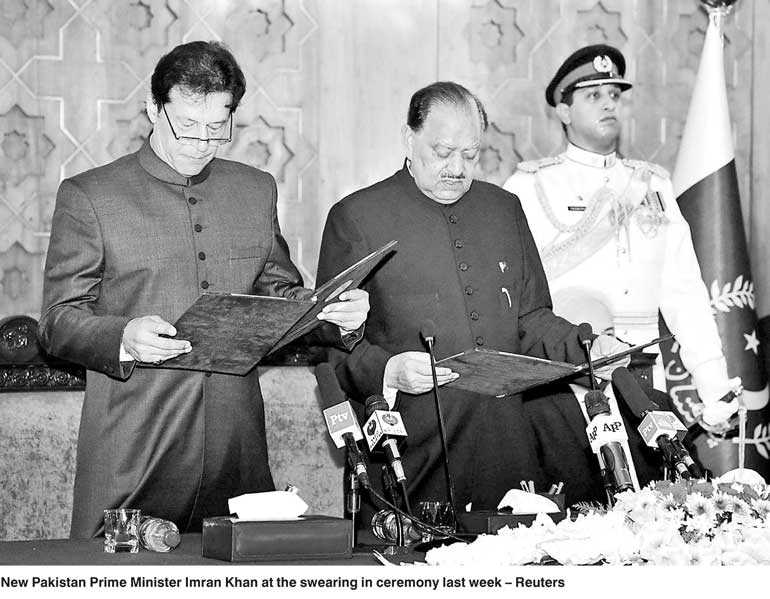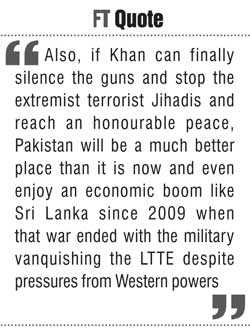Wednesday Feb 18, 2026
Wednesday Feb 18, 2026
Saturday, 25 August 2018 00:10 - - {{hitsCtrl.values.hits}}

By Mano Ratwatte
The newly-elected Pakistani Prime Minister, the flamboyant, albeit bit controversial Oxford-educated cricketing icon and former Playboy who was married three times (like President Trump) before finding conservatism, Imran Khan, ran on a platform of anti-corruption in a land torn apart by war.
Pakistan is being torn between radical Islamic extremist forces and moderates as a spillover from the terrible war in Afghanistan. Pakistan’s military plays a very active role in its political realm. Unlike India, or Sri Lanka, Pakistan has been relatively unstable since its creation and no democratically elected Prime Minster was ever allowed to complete a term of office. Their military plays the most important role; in a way similar to how the Thai military controls its governments and a coup is successful only if it is approved or at least tacitly okayed by their revered king.
Does Pakistan border on being a failed state now because of the trap it laid for itself during the Soviet invasion of Afghanistan in 1979? It became the biggest conduit for weapons and training for all sorts of Afghan, and other Jihadi forces including Bin Laden, that the US sponsored to fight a holy war against the Soviets, who lost and withdrew with their tails tucked in 1989.
Then, after its decision to ally with US after the 9/11 terrorist attacks when General Musharaff was President it became an active state trying to juggle extremist forces and its strong relations with the US: their biggest weapons supplier to fight extremism on their borders as well. Sri Lankans will recall how he flew back from Sri Lanka and overthrew the democratically elected government on allegations of corruption.
Cricketing legend Khan is also pragmatic and sees no end to war and the bleeding of his nation›s resources. He gave a great interview on TV recently which I transcribed. I think there are a lot of powerful sentiments and hopes of the Pakistani people expressed below.
My fear is that extremist Jihadi forces or foreign forces will try to oust him if he keeps to his principles and does what is right by Pakistan, and not by foreign powers. I also look forward to him trying to genuinely reduce tensions between his country and its arch-rival India. In fact Pakistan can learn a lot from India about trying to become a secular nation. If tensions are reduced between the two nuclear armed neighbours, and if they can genuinely address the problems in Kashmir, he would have achieved a lot.
Having had very good Pakistani friends, students and roommates as well, I can easily say that their sore point is always India; having lost three wars so badly to India, they yearn for a day they can beat India in anything: cricket, hockey, war or anything else. Indians don’t suffer from that inferiority complex about Pakistan and usually smirk when they talk about Pakistan. Imagine an open border in Punjab for families separated by the tragic events of partition and its implications for free trade if mutual suspicions and biases can be reduced.
Also, if Khan can finally silence the guns and stop the extremist terrorist Jihadis and reach an honourable peace, Pakistan will be a much better place than it is now and even enjoy an economic boom like Sri Lanka since 2009 when that war ended with the military vanquishing the LTTE despite pressures from Western powers. The West wanted to rescue the LTTE leadership to manipulate and seek leverage to their advantage and theirs wasn’t a concern only for the tragic number of civilian casualties.
Below is the entirety of Kahn’s comments which I was able to transcribe. I hope Sri Lanka›s leaders read them too.
 Khan’s speech
Khan’s speech
“We will only be an ally of the US in peace. It will not be an ally in war. 50,000 Pakistanis have died. This country has been radicalised. We are more insecure than ever before. There is something like $ 80 billion that this country has lost in war; US aid is about $ 20 billion.
“The country is sinking into poverty, into chaos; the state is getting weaker. There is a consensus in Pakistan that there is no military solution therefore we will look for a political solution. We would want to be an ally in peace with the US. It is time to give peace a chance for both Pakistan and the US. We had awful fighting. And if peace means that you are anti-US then people do not understand. Unfortunately some people in the US think that if you do not do whatever the US tells you to do, you are anti-US.
“I believe it is time for the US to make Pakistan a friend, rather than a client state, a hired gun which is paid money to do its bidding. I think that time is over; Pakistan is past that stage. The country can no longer take this war anymore. And I think for the US also, they should also hope this election brings a partner in peace and the US needs a peace partner to exit from Afghanistan.”
Lesson for Lankan leaders
I dearly wish Sri Lankan leaders will read the above and think. The US toppled the democratically-elected Iranian government in 1953 because it didn’t do their (and British colonial) bidding and Iran took charge of its petroleum industry. What was the end result?
And the tempestuous President Trump has created fear and instability along with economic hardship for many nations with the new set of sanctions and boycotts imposed by it. Will Sri Lanka suffer as a result of these sanctions? Sometimes people wonder whether the only reason Trump nullifies so many agreements and even environmental regulations enacted during Obama’s time is spite and visceral hatred, and not because of any logical, military, national security or economic reasons.
Should Khan also fear Pakistan’s extremely powerful military which has far greater control of Pakistan’s political process than any other nation in South Asia? Rumour has it that they backed his candidacy this time because they too are tired of corrupt politicians.
Will foreign powers do what they did in Egypt if Imran does not toe the line? After encouraging democracy, it immediately scuttled the democratically elected Muslim Brotherhood (MB) Government which was alarmingly turning too conservative and oppressive. Do you hear any western nation demanding free and fair elections there again after overthrowing the MB civilian government? General Sisi ‘won’ his free election with 97% of the vote. That is like how Saddam Hussein won elections too.
Remember Sri Lanka’s alleged veering towards China triggered off two very powerful nations in 2015 which helped engineer a successful democratic regime change.
On the other hand, you can see how mute a certain powerful nation is about human rights violations and a large number of deaths of civilians in the tragic proxy war between Iran and Saudi Arabia in Yemen; recently a bomb made in a western nation was dropped on a bus full of schoolchildren by aeroplanes of a close oil-rich ally of this western nation. There was not a peep from that powerful nation. Queer huh? Perhaps the US leaving the UN Human Rights Council means they will no longer impose double standards? One for their pet clients who buy tens of billions of dollars’ worth of deadly weapons and another for the empty-pocket nations like Sri Lanka? Isn’t it high time for some extremely powerful nations to stop toppling regimes violently via coups or even democratically if they do not toe their line or become their errand boys?